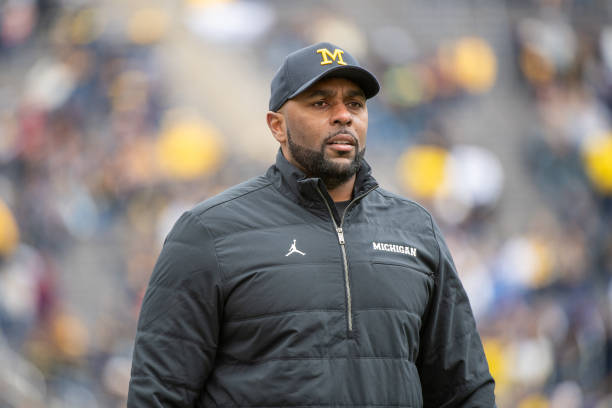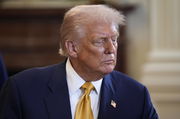

Michigan’s decision to suspend head coach Sherrone Moore for two games to begin the 2025 season wasn’t made in isolation; it was a strategic move aimed at getting ahead of potential NCAA punishment. By choosing to bench Moore for matchups against Central Michigan and Nebraska—but not for Week 2 against Oklahoma—the school preserved its competitive edge while attempting to preempt harsher penalties. But that move may not be enough to sway the NCAA’s Committee on Infractions (COI), which concluded its two-day hearing on the case earlier this week.
Watch What’s Trending Now!
The hearing involved representatives from Michigan, former staffer Connor Stalions, and NCAA enforcement personnel. While Moore wasn’t formally charged with coordinating the sign-stealing operation, his reported deletion of 52 text messages exchanged with Stalions—later recovered—has drawn scrutiny. ESPN reports that this act is tied directly to his suspension and could also factor into the NCAA’s final ruling if seen as a lack of full cooperation. NCAA president Charlie Baker, who was briefed on the COI proceedings, told Ross Dellenger of Yahoo Sports what to expect next.
He shared that a final verdict is expected within 30 to 90 days, placing the timeline between July 11 and September 9. “It was a thorough hearing of the issues, and everybody that wanted to speak their piece, for the most part, got it,” Baker said. He added that “At the end of the day, no one believes at this point that Michigan didn’t win the national title fair and square,” a statement Michigan has leaned on as a public vote of confidence in the legitimacy of its 2023 championship. But this still puts the Michigan Wolverines in an awkward position heading into a season already packed with pressure.
ADVERTISEMENT
View this post on Instagram
Their opener against New Mexico won’t exactly move the needle, but Week 2? That’s Oklahoma. That’s SEC vs. Big Ten. That’s national stage stuff. And that’s when Sherrone Moore will be back on the sidelines—if the NCAA doesn’t drop a hammer before then. Michigan’s calculus was clear: let Moore coach against the Sooners, then suspend him for games with lower stakes. But that move might come off as a little too strategic in the NCAA’s eyes, especially if they interpret it as tone-deaf to the broader investigation. The infractions committee doesn’t take kindly to perceived gamesmanship.
Moore’s involvement remains murky. ESPN reports he deleted a thread of 52 messages exchanged with Stalions, messages later recovered that showed no direct link to the sign-stealing scheme. Still, the deletion and the delay in handing them over may weigh heavily in how the NCAA interprets cooperation. There’s no smoking gun in those messages—nothing directly implicating him in the signal-stealing operation—but the act of deleting them alone could be problematic. The NCAA places a premium on cooperation, and removing evidence, even if later recovered, could trigger a harsher punishment. It’s not just what was said—it’s how long it took to say it.
ADVERTISEMENT
U-Mich’s national title in 2023 is unlikely to be stripped or officially tainted, regardless of the punishment Sherrone Moore may face. Charlie Baker’s quote all but suggests that. Athletic director Warde Manuel echoed that sentiment during recent comments to 247Sports, saying, “That’s something I can say that gives me some sense that they understand that this was a team who won that championship fair and square.” But for critics, especially those in Columbus, State College, or East Lansing, the stain of the Connor Stalions affair won’t be washed away by a clean ruling or an official NCAA statement. For them, perception has always been more potent than protocol.
With a decision likely landing just as fall camps begin—or even days before Moore’s suspension is set to end—the Wolverines remain in limbo Whether Moore’s two-game suspension stands or is extended will depend on the COI’s final interpretation, especially if Michigan is categorized as a repeat offender, a designation that could widen the scope of penalties beyond just coaching discipline.
ADVERTISEMENT
Top Stories
PGA Tour Pro Loses His Cool After Being Denied Entry Into WM Phoenix Open Field

Cowboys’ Major QB Signing Confirmed Amid $31M Dak Prescott News

Patrick Cantlay & Scottie Scheffler Disapprove of Controversial Change Happening to PGA Tour Courses

Ohio High School Football Coach Dies at 90, After Serving Community for 32 Years

U.S. Senator Announces Bad News For NFL Fans After Donald Trump’s Ruling on ESPN’s Billion-Dollar Takeover

Fans Express Disbelief After ESPN Exposes ‘Free League Pass’ as Part of WNBA’s CBA Pitch

NCAA and Michigan are in a tug-of-war
If you think Michigan’s two-game suspension for coach Sherrone Moore was the final word, think again. According to ESPN insider Pete Thamel, this entire situation is beginning to look more like a strategic negotiation than a straightforward punishment. Thamel broke it down plainly: “When you’re negotiating, you don’t do too much,” he said, pointing out that Michigan’s light punishment is likely just a starting point in a larger back-and-forth with the NCAA.
“Clearly, that’s a signal from the other side that the NCAA seems like they think he should be suspended for more, and it’s a negotiation. They’re going to meet in the middle.” That “middle” could mean a lot more missed time for Moore, especially when you consider he’s not a first-time offender in the NCAA’s eyes.
ADVERTISEMENT
Not to forget, Moore already served a one-game suspension back in 2023 for his role in Michigan’s COVID-era recruiting violations. Combine that with this latest incident—deleting text messages connected to the Stalions scandal. That paints a picture the NCAA may not look kindly upon.
Thamel summed it up perfectly: “It’s reasonable to ascertain that Michigan is going in low with the two [games]… Now whether he actually ends up missing those two, whether that’s accepted, whether they do more, there are a lot of variables there.” Oh, and don’t sleep on the possibility that Michigan as a program could be labeled a repeat offender too. That opens the door to recruiting restrictions—or worse, postseason implications.
ADVERTISEMENT
ADVERTISEMENT
ADVERTISEMENT
ADVERTISEMENT
.png)
.png)
.png)



